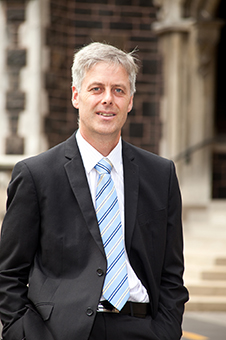Otago research has been given a $14.5 million boost with the announcement of two funding rounds this week.
Seven projects were granted a total of almost $12 million in the Ministry of Business, Innovation and Employment’s Endeavour Funds, while six projects were granted about $2.6 million in Ministry of Health COVID-19 funding.

Professor Nevil Pierse
Professor Nevil Pierse, from the University of Otago, Wellington, has been granted $5.8 million from the MBIE Endeavour Research Programme fund to lead a project bringing together world-leading experts to ensure that Aotearoa’s housing support system is sustainable, effective and whanau-centred.
“Inadequate housing is one of the greatest barriers to the Government’s vision of ‘making Aotearoa New Zealand the best place to be a child’ and to improving the wellbeing of children and young people.”
He says evidence used for Aotearoa New Zealand’s current suite of housing support policies is derived from overseas evidence with an adult focus.
“That means that the effect of inadequate housing on tamariki and rangatahi, and their experiences within the housing support system is poorly understood.
“The Government is set to spend $30 billion on housing over the next five years, but we don’t know what type of housing actually most benefits our children. The goal of this programme is to create evidence to support the development and realisation of housing support systems that improve outcomes for tamariki,” Professor Pierse says.
Researchers will explore the views and experiences of children and young people affected by housing instability and the housing support system, including their aspirations for housing and evaluate the experiences of the housing support system and associated outcomes across the life course.
“We will draw on existing community partnerships, the Integrated Data Infrastructure (IDI), regional mātauranga Māori, and mixed-method approaches to ensure that Aotearoa’s housing support system is sustainable, effective, and whānau-centred.”
Associate Professor Ting Wang, of the Department of Mathematics and Statistics, has been granted $1 million from the MBIE Smart Ideas fund to build the first probabilistic forecasting tool for great earthquakes.
“Our team will draw expertise from Otago, Massey and Victoria universities, GNS Science, and overseas experts to derive the relationship between slow slip events (SSEs) – slow motion earthquakes – and earthquake occurrence.
The Hikurangi Subduction Zone is New Zealand’s largest, most hazardous fault and recently published research suggests a 26 per cent chance of rupture in a magnitude 8 or larger event beneath the lower North Island within the next 50 years.
“This would generate strong ground shaking and tsunami damage widely throughout the country. New Zealand currently has no way of knowing when these great earthquakes will next occur and cause major disruption.
She says SSEs have a tangible, but not well understood, influence on earthquake occurrence rate.
“Although SSEs recur frequently, their recurrence patterns are complex and irregular. The quantitative relationship between SSEs and seismic swarms remains unclear, but it is paramount for short-term earthquake forecasts. As yet, there has been no systematic analysis of swarm-to-SSE-to-great-earthquake relationships globally, which is what we plan to do.”

Associate Professor Michael Jack
Associate Professor Michael Jack, Director of the Energy Programme, in the Department of Physics, has also received $1 million from the MBIE Smart Ideas Fund for his project on avoiding carbon lock-in – understanding the long-term consequences of low-carbon pathways for buildings.
“In this project we want to explore in detail the impacts of energy efficient houses and houses that self-generate electricity on a future highly-renewable electricity grid. We also want to explore the potential trade-off between carbon emissions associated with building materials and operational carbon emissions due to heating and cooling.”
Buildings are responsible for 30 per cent of the world’s and 20 per cent of New Zealand’s carbon emissions and houses, with 90 year average lifetimes, are also one of the longest lived pieces of infrastructure, he says.
“So what we do now will have important long-term ramifications.
“New Zealand currently has very poor housing stock. Much has been written about the detrimental impacts of these houses on health. We need to find a pathway to transform this building stock and at the same time make it future proof. Our research aims to provide the information needed to identify this pathway.”

Professor Richard Blaikie
University of Otago Deputy Vice-Chancellor, Research and Enterprise, Professor Richard Blaikie is pleased Otago’s high calibre research has been recognised.
“MBIE projects need to be innovative ideas with high potential to benefit and positively transform Aotearoa – these are attributes we value strongly at Otago.”
The Ministry of Health announced in April a $9 million fund to support future research into the ongoing impacts of COVID-19 and research into future pandemic responses. Otago researchers were awarded about $2.6 million for six projects.
“Otago’s researchers have been at the forefront of this COVID-19 pandemic from the beginning, and this funding will ensure we can continue to make a positive contribution,” Professor Blaikie says.
“All of these projects will lead to tangible benefits for New Zealanders, and we wish our recipients every success in their endeavours.”
Ministry of Health COVID-19 Research Fund
- Associate Professor Garry Nixon: What factors underpinned the successful (or otherwise) rollout of the COVID-19 vaccination programme and pandemic response in different rural communities? $486,000
- Professor Rhiannon Braund: Does the increased attention of COVID-19 vaccine-related side effects change reporting behaviour of other vaccines? $329,000
- Dr Maira Patu (UOC): Māori solutions for Global problems: Ngā Hua Akoranga, Learning from MIHI Māori Mobile Vaccination programme to achieve equity, $435,000
- Dr Tim Chambers (UOW): The role of digital contact tracing to support improved pandemic responses, $360,118
- Dr Jennifer Summers (UOW): Understanding key epidemiological features of the Covid-19 pandemic in NZ to improve the response, $483,167
- Dr Julie Bennett (UOW): Understanding the impact of vaccination on Covid-19 infection and long-term health outcomes, $486,000
MBIE Endeavour Fund – Research Programmes
- Professor Nevil Pierse, (UOW): Improving the housing system for children and youth experiencing homelessness – Nevil Pierse & Team to update, $5,837,561.15
MBIE Endeavour Fund – Smart Ideas, $1 million
- Associate Professor Michael Jack: Avoiding carbon lock-in: Understanding the long-term consequences of low-carbon pathways for buildings
- Associate Professor Ting Wang: Forecasting future megaquakes on New Zealand’s biggest fault: The Hikurangi subduction zone
- Dr Graham Eyres: Recovery of high-value, natural flavour compounds from untapped food processing sources
- Dr Gianna Savoie: Moriori, Music and Manawa: Engaging Multisensory Experiences for Indigenous Cultural Revitalisation
- Professor David Prior: Tere Tīpako Tio: Rapid Extensive Antarctic Ice Sampling
- Associate Professor Rajesh Katare: Cell free synthetic exosomes incorporated nanomatrix for the treatment of ischaemic diabetic ulcer








